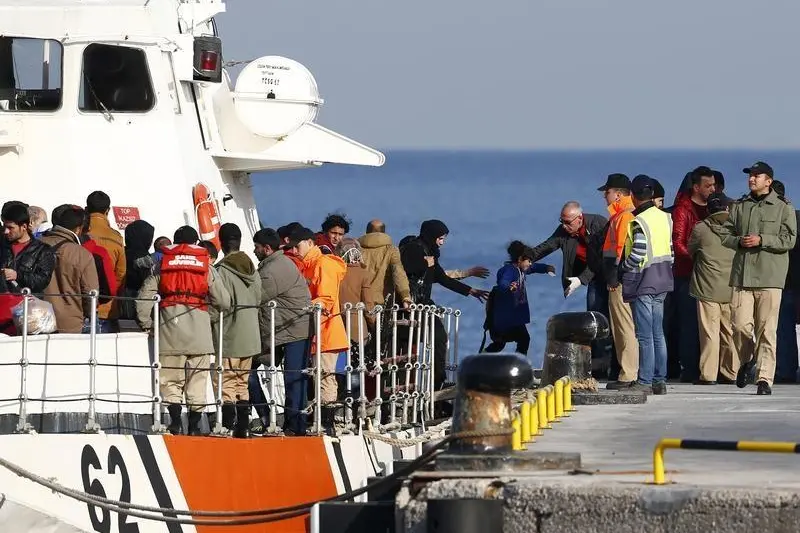PHOTO
It seems that the issue of migration will remain a constant in the UK government’s post-Brexit bluster, as well as being an EU-wide headache.
Every day, more migrants seem to be reaching British shores, despite the increased interception efforts and measures to turn back boats on both sides of the English Channel. Some 1,115 undocumented migrants landed in Britain over just two days last week. The rising numbers of Channel crossings by migrants in small boats is contributing to growing tensions between the UK and France following the former’s departure from the EU. On Saturday, British authorities said their forces had recovered 491 people in 17 operations, after they recovered 624 migrants in 23 such operations the previous day. The French managed to turn back 414 people over the same two days.
After promising to take back control of the country’s borders following Brexit, Britain's ruling Conservative Party has proposed legislation to overhaul asylum rules. But it does not seem that stricter jail terms for people smugglers and, controversially, for migrants that arrive in the country illegally has succeeded in stopping the flow this year, with about 17,000 having crossed the Channel so far in 2021 — double the number that arrived last year.
The latest less-than-cordial exchanges between Paris and London regarding the many issues that have surfaced in the post-Brexit era, such as migrants, fishing rights, threats to cut the power supply to the island of Jersey, and the tripartite AUKUS alliance, have not helped matters, to the point that the French recently called for a UK-EU treaty to manage migration.
The France-UK problems are not unique in the world today, as migration is increasingly being used as a political pressure tool. For example, 2015 saw what became known as the European refugee crisis, when hundreds of thousands of mostly Syrian refugees crossed into the EU from Turkey. This continued until Brussels agreed to pay the Turks to curb the flow. Meanwhile, the Libyan conflict that started in 2011 has opened Southern Mediterranean waters to thousands of economic and non-economic migrants fleeing Africa, crossing to Italy in small boats en route to Northern Europe and the UK.
The newest such route is from Belarus, with record numbers of Middle Eastern migrants and refugees being allowed to cross its borders with Poland and Lithuania en route to other European countries. This is apparently part of a strategic response by Minsk to the EU sanctions imposed on the country as a result of its poor human rights record and its violent clampdown on protests and political activists after last year’s controversial election, which kept President Alexander Lukashenko in power.
So it is not strange to hear calls for new treaties to govern the inflow of refugees, or for nations to call for funds to help with the cost of beefing up their police presence to prevent migrant crossings. Some countries have introduced initiatives to train and arm coast guard units to stem such flows, while others have built border walls. Some states have turned a blind eye to the matter as a means of exerting pressure on neighboring countries or their political enemies.
Clearly, the issue of migration is becoming an increasingly burdensome matter that is testing the champions of tolerance and inclusiveness in the Western world, while also proving to be a useful tool if weaponized to serve states or non-state entities. People's movement from the Global South to the Global North has never stopped and has, over the years, taken various shapes, from those fleeing curbs on freedoms to those fleeing military conflicts or civil strife and those dreaming of a better life somewhere else.
Net migration figures toward Western countries have always been on the increase and have helped those countries make up for having aging populations. What has changed recently, however, is the weaponization of the issue.
Many nations in the Western world have used migration and refugees as a ticket in their electioneering narratives. Migrant arrivals, asylum seeker numbers and economic refugees have been winning elections for some and making others lose power, yet the problem remains and, if anything, is becoming even more complex.
UN High Commissioner for Refugees Filippo Grandi last week slammed countries for what he termed as the externalization and politicization of migration issues, from North America to Australia and through Europe. He said this was a betrayal of UN conventions and an abdication of states’ responsibility to help those dispossessed and in need of shelter. He also singled out Hungary, which has vowed to “protect its borders” and asked the EU to stop the flow of arrivals — a call for action that contradicts EU values and spirit of solidarity.
Grandi, though, failed to expand and tell us how refugee issues have increasingly been weaponized by non-Western states too, and how states in the EU should, for example, respond to a belligerent Belarus and its efforts to openly funnel refugees from Syria and Iraq and maybe soon Afghanistan to Western Europe in an attempt to coerce, blackmail and respond to what it believes is an unfairly applied sanctions regime.
Refugees, asylum seekers and economic migrants are tools in the power games of nations in our divided world. The erosion of diplomacy and multilateral mechanisms of state control have left a vacuum that could take our world in a direction that all would regret.
- Mohamed Chebaro is a British-Lebanese journalist with more than 25 years’ experience covering war, terrorism, defense, current affairs and diplomacy. He is also a media consultant and trainer.
Copyright: Arab News © 2021 All rights reserved. Provided by SyndiGate Media Inc. (Syndigate.info).





















